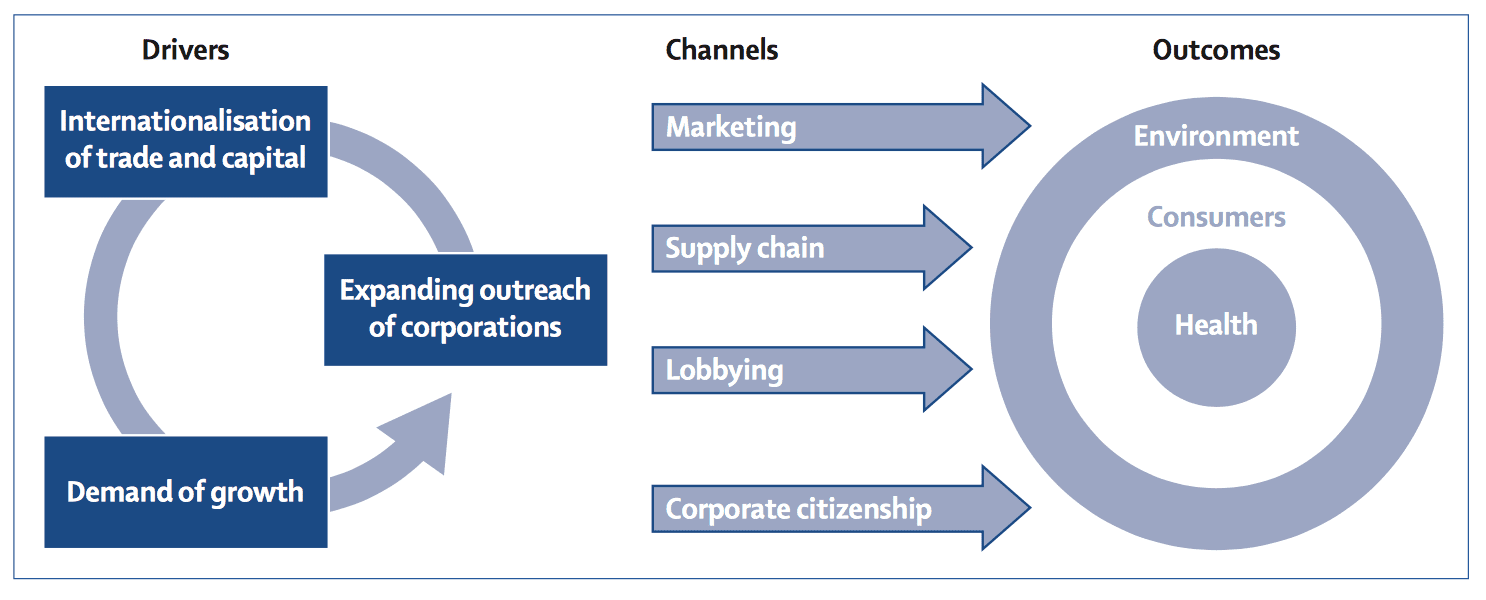Comment
The Commercial Determinants Of Health
WHO Director-General Margaret Chan has noted that “efforts to prevent non-communicable diseases go against the business interests of powerful economic operators”.1 Selling processed food and drink, alcohol, and tobacco is big business and demand is booming, especially in low-income and middle-income countries.
There has always been critical public health analysis of the power of the corporate sector— especially in the field of tobacco—and attention has turned to other areas in recent years, including work on unhealthy commodities,2 industrial epidemics,3 profit-driven diseases,4 and corporate practices harmful to health.5 The focus on lifestyle choices has also been extensively critiqued, especially in relation to marketing to children.6
These domains of study share significant overlaps, yet researchers are often divided by discipline, approach, and health topic. We believe there is value in conceptually uniting this work under the banner of the commercial determinants of health: a synergistic, multidisciplinary field that addresses the drivers and channels through which corporations propagate the non-communicable diseases pandemic.
Previous definitions of commercial determinants of health have stressed the fundamental conflict between imperative shareholder value maximisation and population health—for example, West and Marteau’s “factors that influence health which stem from the profit motive”.7 This broad definition does not capture the inherent complexity of commercial determinants, and the profit motive also applies to companies that sell health-promoting products such as fruit and vegetables. Other definitions have stressed the centrality of consumption, but there are other channels through which companies influence governments, society, and consumers.
We define the commercial determinants of health as “strategies and approaches used by the private sector to promote products and choices that are detrimental to health”. This single concept unites a number of others: at the micro level, these include consumer and health behaviour, individualisation, and choice; at the macro level, the global risk society, the global consumer society, and the political economy of globalisation.
Three inter-related factors have changed the global business and consumption landscapes while boosting the power of large companies: rising demand, increasing market coverage, and the continued internationalisation of trade and investment (figure). Empirical evidence can be found in the escalating number of international trade deals, inexorable market penetration in low-income and middle-income countries, and metrics such as the MSCI Consumer Staples Index (covering tobacco, food, and drinks), which has grown by 200% in low-income and middle-income countries over the last decade.
Corporate influence is exerted through four channels: marketing, which enhances the desirability and acceptability of unhealthy commodities; lobbying, which can impede policy barriers such as plain packaging and minimum drinking ages; corporate social responsibility strategies, which can deflect attention and whitewash tarnished reputations; and extensive supply chains, which amplify company influence around the globe. These channels boost corporate reach and magnify the health impact of commercial enterprise. The breadth and depth of corporate influence is expanded as more people are reached with ever more consumption choices.
The absence of publicly available data on corporate practices is a major issue and concerted efforts to quantify these channels are an important task for the public health community. Select data are available; for instance Coca-Cola, PepsiCo, and the American Beverage Association spent a total of US$114 million on lobbying at the federal level between 2009 and 2015;8 45% of people living in countries that have ratified the Framework Convention on Tobacco Control report continued exposure to tobacco marketing;9 and companies openly speak about using so-called corporate citizenship to buff their public image.10
Health outcomes are determined by the influence of corporate activities on the social environment in which people live and work: namely the availability, cultural desirability, and prices of unhealthy products. The environment shapes the so-called lifeworlds, lifestyles, and choices of individual consumers—ultimately determining health outcomes.
The commercial determinants of health framework presented here is not intended to be exhaustive, but to spark the discussion that ends with the establishment of the commercial determinants of health as a stand-alone field of study, reflected with courses and departments at universities and public health institutions worldwide.
The rise of non-communicable diseases is a manifestation of a global economic system that currently prioritises wealth creation over health creation. Many key problems and solutions lie outside the health sector, especially in the domains of international finance, trade, and investment policies. There is no quick fix for misaligned incentives, uncorrected externalities, and widespread cognitive dissonance. The paradoxes of the 21st century demand deep interdisciplinary collaboration and the concept of commercial determinants of health provides this distinct conceptual space for uniting different researchers and policy makers in pursuit of a common goal. Advancing the systematic consideration of the private sector is vital to promoting health in an increasingly globalised and consumer-oriented world.
In the vernacular of our corporate colleagues, our current piecemeal efforts to combat the commercial drivers of non-communicable diseases is leaving value on the table. It is time to systematise our efforts to confront commercial drivers of disease.
At the time of submission LA was a staff member of the WHO. The authors alone are responsible for the views expressed in this article and they do not necessarily represent the decisions, policy, or views of the WHO. This Comment is based on a discussion paper prepared for the WHO Global Coordination Mechanism on NCDs: Conceptualizing the commercial determinants of health to counter the global rise of NCDs, written by IK with support from CF. We declare no competing interests.
—
List of references
Find the complete list of references on the original page of the article.

